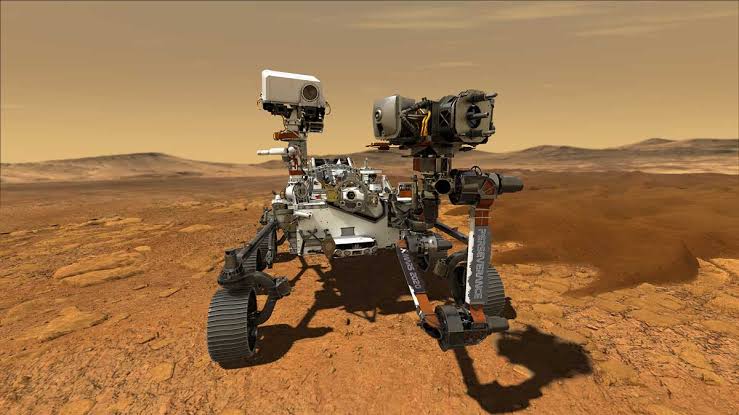In physics, sound is a vibration that propagates as a wave, through a transmission medium including a fuel, liquid or stable. In humans, sound is the reception of such waves and their belief through the brain only waves form that have frequencies lying between approximately 20 Hz and 20 kHz.
Sound waves that are above 20 kHz are called ultrasound and aren’t audible to people. Sound waves below 20 Hz are called infrasound, few animal species have different hearing levels.
Also, sound requires a material medium to propagate, thus sound cannot propagate in space or vacuum.
But things are different on the surface of Mars as it has a very thin atmosphere, but it is enough for sound to travel and be heard on Mars. Although it will be different from what is heard on Earth. What will be the sound on Mars this has been all over the news and it would be interesting if we were able to hear something on Mars.
Read: Mars Perseverance Rover: NASA delivered 10 million Names to Mars
What Is Perseverance Rover?

Perseverance, nicknamed Percy, is a vehicle-sized Mars rover designed to discover the Jezero crater on Mars as part of NASA’s Mars 2020 mission. It was manufactured by the Jet Propulsion Laboratory and released on 30 July 2020 at 11:50 UTC. Following the rover’s arrival, NASA named the landing site as Octavia E. Butler touchdown.
Perseverance has a similar design to its predecessor rover, curiosity, from which it became little upgraded. It incorporates seven number one payload gadgets, nineteen cameras, and two microphones.
The rover additionally carried the mini-helicopter Ingenuity to Mars, an experimental aircraft and generation show off that made the primary powered flight on some other planet on 19 April 2021. Up to now, Ingenuity has made 19 flights.
The rover’s goals include figuring out historic Martian environments able to support existence, searching out evidence of former microbial existence existing in the ones environments, accumulating rock and soil samples to store at the Martian surface, and trying out oxygen manufacturing from the Martian ecosystem to prepare for future crewed missions.
Also read: NASA’s Perseverance rover completes a year full of surprises & discoveries
How Will The Perseverance Rover Help To Detect And Record Sound?
The Perseverance rover contains microphones, letting us without delay record the sounds of Mars for the very first time.
Even though Earth and Mars are totally extraordinary planets, it can be comforting to know that if you had been on Mars, you might nevertheless sound quite just like yourself.
If you have been standing on Mars, you’d listen to a quieter, more muffled model of what you’d listen to on the planet, and also you’d wait slightly longer to listen to it. On Mars, the atmosphere is totally exclusive.
However, the biggest alternative to audio could be high-pitch sounds, higher than most voices. Some sounds that we’re used to on the earth, like whistles, bells or chook songs, would nearly be inaudible on Mars.
How Does Sound Propagate?
While we listen to sound, what we’re sincerely experiencing is our eardrums vibrating. That vibration comes from waves of strain that journey to our ears from the supply of the sound. To get to our ears, the waves want something to journey through, like air.
Sound waves can tour via liquids or even solids, but most of what we pay attention to comes through the air.
Read more: How will NASA return samples from Mars?
How Will The Speed Of Sound On Mars Be Unique?
Mars has uncommon surroundings in comparison to Earth, with very unique temperature, density, and chemistry. Those differences could have three important results on the sound you’d listen to.
Sounds emitted inside the cold Martian environment could take a little longer to get to your ear. With an average surface temperature around -eighty one F (-63 C), Mars has a decreased velocity of sound, around 540 mph (~240 meters per 2d), as compared to approximately 760 mph (~340 meters in line with 2d) on earth. You won’t be able to notice this when near, but you can if you are at a distance.
The sound level you would hear might routinely decrease on Mars since the Martian ecosystem is about a hundred times less dense than on the earth, there’s just lots much less of it.
The sound level you would hear might routinely decrease on Mars. Since the Martian ecosystem is about a hundred times less dense than on the earth, there’s just lots much less of it. That influences how sound waves travel from the source to the receiver, resulting in softer signs. On Mars you’d need to be very near the supply of a source of sound to pay attention to it, as compared to the identical volume as you will hear on earth.
The surroundings of Mars, made of ninety six percent carbon dioxide, might take in a variety of higher-pitched sounds, so best decrease-pitched sounds could travel long distances.
This effect is known as Attenuation-a weakening of the signal at certain frequencies and it’d be more substantive the farther you had been from the source.
